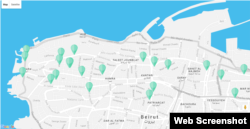It had happened countless times to her before, but when Myra el-Mir shared her anger at being followed by a car full of men and verbally abused, a chance response from a friend gave her cause for reflection.
“She told me I should report it on a new site she’d heard about,” said el-Mir, who, coincidentally, had just launched the site in question – HarassTracker, Lebanon’s first online tool mapping sexual harassment.
It is exactly the kind of exchange that those behind the website, which went online just two weeks ago, want to generate.
In doing so, they want to help women in Lebanon overcome a culture of acceptance and speak out about a topic that, for many, is as taboo as it is prevalent.
"It's Something You Expect"
“The main problem we face is that you’re supposed to accept it whether walking down the street or taking a taxi,” said el-Mir. “It’s something you expect.”
HarassTracker, which includes resources and links, aims to play a role in helping change that.
It allows victims to anonymously pinpoint where in Beirut they have experienced sexual harassment and include a brief description of what happened.
The hope is that the online map will be rolled out to Lebanon more widely after three months.
“We want to allow people to speak anonymously as we know how vicious and virulent the shaming culture is,” added Nay el-Rahi, who also worked on the site alongside friend and fellow activist Sandra Hassan.
“The idea is that in saying this is wrong and this is happening, the act of reporting itself is empowering.”
Inspiration from Egypt
The inspiration behind HarassTracker can be found in Cairo, where a similar site was set up in 2010, just before Egypt was swept up in revolution.
Since then, the site in Egypt, HarassMap, has accumulated around 1,500 reports documenting harassment in categories ranging from catcalls to rape and mob attacks.
“It remains a huge problem, but now the issue is more in the open and it is being discussed,” said Noora Flinkman, a spokeswoman for HarassMap.
“There are lot of reasons why, but HarassMap played a part in that,” she added.
Some of these victories are more tangible than others.
In 2014, sexual harassment in Egypt was made a crime punishable by up to five years in jail.
Lack of recognition
In Lebanon, there is no law against sexual harassment.
Laws relating to gender and violence are all too often unaltered relics from the time of the French mandate well over half a century ago, while the country’s extensive network of religious courts often proves less than progressive on the issue.
Meanwhile, lack of recognition both among the public and by authorities means that statistics are hard to come by.
A 2012 study, however, reported that more than a third of women experienced ‘rude, vulgar or harassing noises and gestures’ toward them ‘most or every time’ they go out in public.
“The issue is massively undocumented,” said el-Rahi, who said that harassment and sexism are not just local problems, but global ones.
“We think that by having it on a map it will allow us to be able to quantify it and gather information that is a bit more concrete. This should make it easier to prove what is happening.”
No one to go to
Beirut resident Haya Farah welcomes the arrival of the site.
The 25-year-old recalled how she felt after a driver of one of the city’s many taxis performed a sexual act in front of her.
“I was shocked. I consider myself rebellious but felt very weak at the time,” said Farah, who told VOA that eight years on she still blamed herself for not reacting differently.
Farah didn’t go to the authorities at the time – she said she wouldn’t trust them to help and would be better off posting about her experiences on social media instead.
Many women who spoke to VOA about the issue said they did not feel authorities would necessarily take them seriously.
Meanwhile, within these authorities, the gender bias is clear - a source from the Internal Security Forces, (ISF), which oversees policing in the country, revealed that of 26,100 staff, around 1,000 were women.
Beyond the activists
Pins documenting harassment are already scattered across the HarassTracker map of Beirut.
Roula Masri, who works with gender equality-focused non-governmental organization Abaad, warns that while the tool could be very useful, the real challenge will be to reach “beyond activists.”
Last month, Amnesty International detailed the harassment faced by Syrian refugee women in Lebanon, who it said were at high risk of exploitation because of their financial situation.
And all of those pushing for women’s rights are fully aware that, while the site can give much-needed visibility to the issue, the fight is a far bigger one.
“There is such a burden on women all the time,” added Masri. “This is one step, and we must always be taking steps forward.”






